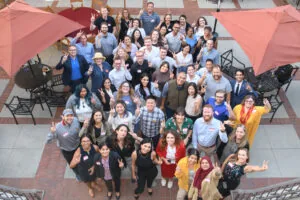Description
Over the last decade, Latinos have become the second largest population in the United States. With a steady increase in numbers, their influence on American politics, history and culture has strengthened. This community with divergent belief systems has been the cynosure of political parties, especially during elections.
In celebration of Hispanic Heritage month, USC Center for the Political Future (CPF) Fall 2021 Fellow Gloria Molina discusses the rising impact of Latino voters, how Democratic and Republican parties are reaching these voters and how COVID-19 has impacted Latino communities.
This seminar features Cesar Martinez (media strategist for Jeb Bush, George W. Bush, John McCain and Mitt Romney’s presidential campaigns), Mindy Romero (founder and director of the Center for Inclusive Democracy and research assistant professor at USC Sol Price School of Public Policy), 41st Mayor of Los Angeles Antonio Villaraigosa (partner and co-chair at Mercury Public Affairs) and Robert Shrum (CPF director and Warschaw Chair in Practical Politics at USC Dornsife College of Letters, Arts and Sciences).
Who Will Benefit
– Policymakers wanting to know how the election landscape changed over the years
– Those seeking to know about the impact of the Hispanic community on elections
– Young voters looking to assess how different political parties are reaching voters
About Our Featured Faculty
Gloria Molina, fall 2021 fellow at the USC Dornsife Center for the Political Future (CPF), represented the L.A.’s First District on the Los Angeles County board of supervisors for more than two decades. Growing up in the Pico Rivera area, she learned that eliminating unfair barriers is the best way to ensure equal opportunity. From founding East L.A.’s Comisión Femeníl Mexicana Nacional to serving in the Carter White House, that idea has driven her lifelong commitment to public service.
In 1982, Molina made history as the first Chicana elected to the California State Assembly. In this role, she combined passionate advocacy with formidable political skill to strengthen communities in the 56th Assembly District and statewide. In 1991, she became the first Latina to join the Los Angeles County board of supervisors, where she was known as a fiscal watchdog committed to good government reforms, maintenance of the county’s public health care delivery system and quality-of-life issues — particularly for the one million county residents residing in the unincorporated areas.
Named as one of the Democratic Party’s “10 Rising Stars” by TIME magazine in 1996, Molina served as one of four Vice Chairs of the Democratic National Committee through 2004. During the 2000 Presidential Election, Molina was one of 15 top women leaders nationwide to be named as a possible vice-presidential candidate by the White House Project, a non-profit, non-partisan group dedicated to raising awareness of women’s leadership in American politics.
Mindy Romero is the founder and director of the Center for Inclusive Democracy (CID), which is part of the USC Sol Price School of Public Policy and is based in Sacramento, California. Romero is a political sociologist and holds a PhD in Sociology from the University of California, Davis. Her research focuses on political behavior and race/ethnicity, and seeks to explain patterns of voting and political underrepresentation, particularly among youth and communities of color in California and the U.S. Her research has been cited in major news outlets, including The New York Times, Washington Post, Los Angeles Times, Sacramento Bee, Politico and the Huffington Post. She has also been a frequent guest on National Public Radio, Capital Public Radio and several other NPR-affiliated stations in California. She is a regular op-ed contributor to the Sacramento Bee and CalMatters. She is currently an adjunct fellow of the Public Policy Institute of California (PPIC) and former member of their Statewide Survey Advisory Committee. Romero is a member of the California Secretary of State’s Taskforce on the Voter’s Choice Act. She is the former Chair of Mutual Housing California and former Vice-Chair of the Social Services Commission for the City of Davis.
Robert “Bob” Shrum is the director of the Center for the Political Future and the Carmen H. and Louis Warschaw Chair in Practical Politics at USC Dornsife. A legendary political strategist, he was described as “the most sought-after consultant in the Democratic Party,” by The Atlantic Monthly. He was the strategist in over 25 winning U.S. Senate campaigns, eight successful campaigns for governor, successful campaigns for mayors in major American cities, and numerous campaigns for Congress and other statewide offices. His numerous clients included Edward Kennedy, Joe Biden, John Glenn, and Barbara Mikulski, David Dinkins and Tom Bradley — and John Kerry and Al Gore in their presidential races. Overseas his clients included Israeli Prime Minister Ehud Barak, the British Labour Party, the Prime Minister of Ireland, and the Presidents of Colombia and Bolivia.
In 2005 he shifted his attention to the academic world. Professor Shrum teaches several classes at USC on domestic policy, applied politics and elections. He had previously taught at New York University, was a Silliman Fellow at Yale and Kennedy Fellow at the Institute of Politics at Harvard. He was also the director of debate at Boston College, and prior to that at Brandeis University. Shrum’s book, No Excuse: Concessions of a Serial Campaigner, was a national bestseller published in June 2007 by Simon and Schuster. He is a graduate of Georgetown University and Harvard Law School.



